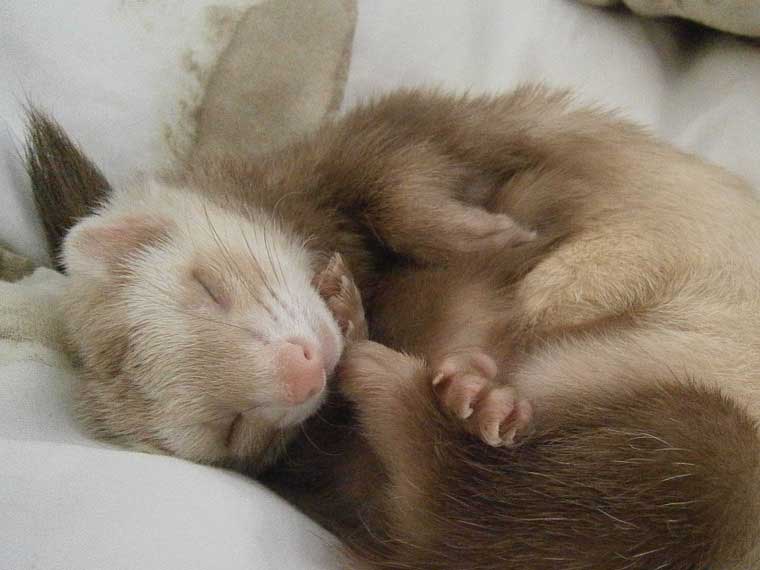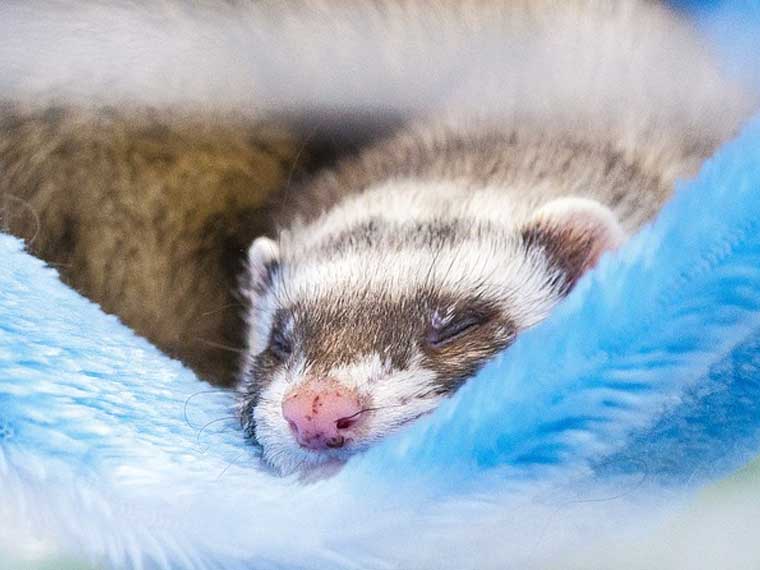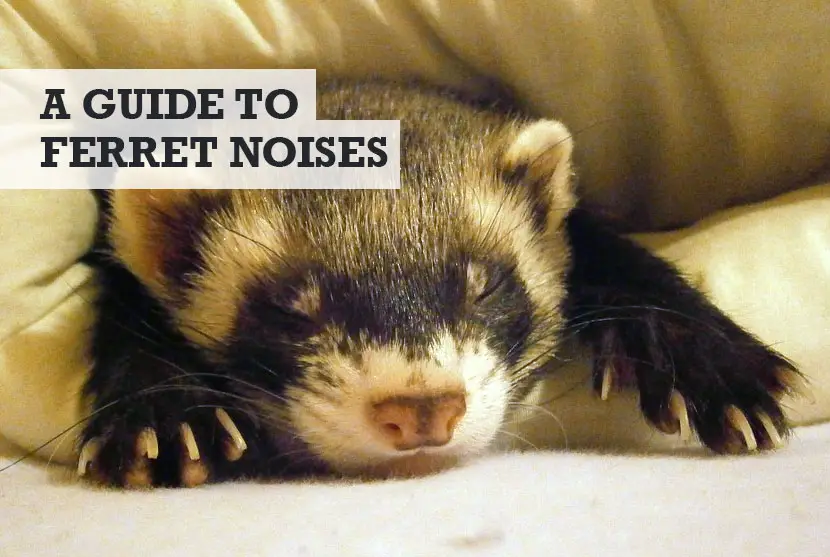Ferrets are sociable and communicative animals. Part of their bonding is expressed through a range of distinctive sounds. They use this ‘ferret language’ to vocalise their emotions, intentions and reactions to situations they find themselves in.
Some ferret noises and weird, and will take some getting used to. In this guide I am going to try and explain what ferret noises mean. Before I go any further though with the fun ones, there’s one ferret noise meaning all new owners need to be aware of; weird breathing.
Why is my ferret making weird breathing noises?
If your ferret is making weird breathing noises, pay attention as it could be related to a respiratory issue and need a quick vet diagnosis. Ferrets can suffer with a range of illnesses or even blocked throats due to food getting stuck.
One illness that could also lead to a ferret making weird breathing noises is sinusitis. This results in their sinus passage swelling up, making it harder for them to breath. You might notice your ferret breathing though his mouth in a more pronounced manner too.
Now that warning is over weird breathing, here’s a lowdown on ferret noises and their meanings.

What ferret noises mean
Your ferret is making weird noises for a wide variety of reasons at different times of the day. You might hear a strange dook sound, hissing, whining, noises when sleeping… all sorts. Here’s what ferret noises mean in short.
The brief glossary of sounds as follows:
- Dooking: a continuous happy sound.
- Barking: an excited chirping sound.
- Hissing: a warning he’s not happy.
- Squeaking: with delight.
- Whimpering: a prelude to a tantrum.
- Whining: a distress call.
- Screeching: an unpleasant sound, often accompanied with fear aggression.
- Grinding their teeth: could be grooming or an indication of pain.
- Sneezing: usually as a result of environmental irritation.
- Coughing: needs further investigation.
- Wheezing: likely to indicate a respiratory condition.
- Snoring: your ferret is sound asleep.
More on those funny ferret sounds
Ferrets are not the loudest animals on the planet, and they are not all equally vocal. Their level of interaction with humans, ferrets and other animals depends much on their individual temperament.
The weird sounds they make may be difficult to distinguish, one from another, if you are not familiar with your ferret’s overall behaviour. It pays to study their body language and non-verbal cues.
The various noises that ferrets make need to be interpreted in context, as they range from announcements of playfulness, to excitement, to distress. There are yet others that may indicate that your pet is not well.
Always pay attention to sounds that raise an alarm, or that are repeated continuously.
Dooking
This is a happy, excited sound that ferrets make. It is their equivalent of laughing or giggling. To humans, it may sound like the noise a clucking hen might make. Dooks are emitted in series, like a continuous babble.
Mother ferrets use dooking to reassure their babies but it can also be used by young ferrets as an invitation to play. In this case, it would be accompanied by erratic movements, sometimes called a war dance.
Your ferret could make this sound of delight while you are stroking or tickling it. You might also hear it if it encounters something new and exciting, or if playtime gets too rough and your ferret becomes annoyed or frustrated.
Here’s an example of a ferret noise audio: the dooking noises!
Barking
This sound is sometimes referred to as chirping. It is an indication of excitement which may or may not be a pleasant experience for your pet. Two or three chirps are no cause for alarm but if it continues, you will need to investigate the cause.
You ferret may be stuck somewhere or it may be irritated at rough play. It could also be showing its dissatisfaction with what you have done, like showering it with cold water or some similar infringement.
Handy Hint: I did some new research into whether dogs and ferrets can get along and live together in harmony.
Hissing
This is a low sound made at the roof of the mouth. It can be a short or long sound. It is unlike a cat hiss which is generally louder and longer.
Hissing could emanate from a ferret pair who are fighting playfully, or from intact males who are expressing moods associated with hormonal activity.
More often than not, the hissing noise your ferret makes is when he feels annoyed, frustrated, anxious or threatened. Try to neutralise the perceived threat or remove the ferret from the situation.
If there is no threat and the ferret is just agitated, give it some reassurance and try to restore it to a calm state of mind.
Handy Hint: Here’s my tips on how you can calm a hyper or baby ferret down.
Squeaking
This is another sound associated with playfulness. It is a soft, high pitched sound that is close to a squeal of delight. Your ferret is attempting to interact with you or one of its playmates. It is having fun. Enjoy the moment.
Whimpering
This is attention seeking behaviour, much like a child would display when it cannot get its way. Your pet is dissatisfied and is throwing the equivalent of a tantrum.
It may be wanting another treat or yet another toy which is needed for immediate gratification. If you give in, you will be your ferret’s slave for life. It is testing your authority.
Hold firm and distract the ferret by giving it some affection and reassurance.
Whining
This may sound like the ferret has upped the ante when the whimpering did not work. Unfortunately, although this weird ferret noise sounds a lot like whimpering, whining can prove to be quite serious, if it persists.
A baby ferret may employ this tactic if it has recently been weaned or moved to a new home. It will need reassurance.
In older, more settled ferrets, this sound usually indicates pain or illness. If your ferret continues to whine after you have tried to reassure and appease it, seek medical advice.
Handy Hint: Perhaps your ferret is whining because he is too hot? Here’s how to keep a ferret cool in the summer.
Screeching
As you can imagine, this is not a pleasant sound. This high pitched scream denotes heightened emotion. The ferret is anguished and experiencing fear, pain, or both.
The screech may be accompanied by a puffed up tail, otherwise known as a bottle brush.
You need to pay attention and react swiftly. Your ferret may be being bullied or faced with another unfamiliar and threatening situation.
It may show signs of fear aggression and will need to be calmed before attempting to touch it. Be gentle and reassuring.
In its excited state, the ferret may nip or bite so approach it gently and use safety gear, such as gauntlets, if necessary.
Grinding their teeth
If this is done shortly after mealtimes it may be the ferret equivalent of chewing the cud or picking its teeth. There is nothing to be concerned about.
If you hear this sound in another context, it may mean that the ferret is in pain or feeling stressed. Monitor its behaviour and take appropriate action if it continues, for example, visiting the vet.
Sneezing
This is usually not a cause for concern. Like humans, and other animals, there may be environmental factors irritating the nasal passages.
When ferrets sneeze, they do so a number of times in rapid succession. Each sneeze will be accompanied by an exaggerated movement of the head.
If the sneezing persists for a period of time, look for allergenic substances in the environment and remove them.
If the sneezing is accompanied by a runny nose and discharge from the eyes, this could be a more serious sign, and should be monitored closely.
Coughing
Coughing is not a commonplace sound for a ferret to make. It is a high-pitched, staccato sound and is usually the sign of something more serious than an allergy or irritation.
If the cough continues for a considerable period of time, i.e. for hours, it could indicate that your ferret has respiratory problems or a heart condition. You will need to pay a timeous visit to a vet that specialises in ferrets.
Wheezing
Similarly, wheezing is not a sound that is usually associated with healthy ferrets. It is likely to be a symptom of respiratory problems and needs prompt medical attention.
Snoring
Most animals snore from time to time when they sleep. It may be air passing through the ferret’s teeth or the position in which it is sleeping may cause a slight blockage of the airways.
Snoring is nothing to be concerned about, unless it is accompanied by congested nasal passages when the ferret is awake.

What is an angry ferret noise?
Signs that your ferret is angry are noises including whimpering and hissing. In fact, if you do hear your ferret making an angry noise like this, give them some space.
This goes the same for when they are near other animals in your home. Pets like cats and ferrets can get along, but look out for warning signs.
I recommend you monitor them in case they have a health issue or some pain that they otherwise cannot tell you about.
What sounds do baby ferrets make?
Baby ferret noises tend to range between from the whining, crying, and hissing, to dooking and barking. Refer to above on what ferret noises mean to understand better how your baby ferret is feeling.
Ferret noises while eating
Ferrets will also make weird noises while eating. This can include sounds such as teeth grinding though to whistling when eating. Whistling noises when eating is often reported so nothing to worry about.
Of course, if it sounds more like choking, take action!
Funny ferret noises when sleeping
Ferrets will make weird noises when sleeping too including snoring, but also squeaking. The snoring is to be expected as all animals do it.
When you hear your ferret making snoring noises when sleeping this will probably just be them have a little dream.
So, if you are a light sleeper and worried about a ferret making noise at night, they might not be the best choice of pet for you… particularly when you factor in costs of ownership.
Why is my ferret honking?
The noises of a ferret honking will often relate to them not being unhappy. It’s quote common with young ferrets who will cry, which is often also described as a honking sound.
What noises does a ferret make when hurt?
The typical noise a ferret makes when hurt and in pain will be whimpering or whining sounds. You might notice that your ferret make a strange whinging sound when you pick him up. If it’s an adult ferret, this is almost certainly due to pain.
Ferret noises audio
And lastly, here’s some ferret noises audio so you know what to expect!
Conclusion
Now you know what type of noises ferrets make, you might be thinking twice about getting one! But in all seriousness, ferrets are known for making some weird noises, but most are very endearing and just their way of communicating.
You might also like…
- How long a ferret can go without eating
- Tips for bathing and washing dirty ferrets
- This is why you have a smelly ferret!
Image in header via https://pixabay.com/photos/ferret-relax-tenderness-660547/


